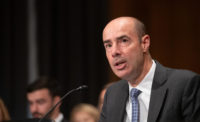US DOT Move to Revise TIGER Grants Faces Heat in Senate
A U.S. Dept. of Transportation plan to reshape and rename the Transportation Investment Generating Economic Recovery, or TIGER, grants has come under fire from senior Senate appropriators. Sen. Susan Collins (R-Maine), who chairs the appropriations subcommittee responsible for DOT’s budget, and Sen. Jack Reed (R.I.), the panel’s top Democrat, say DOT’s plan to make states’ and localities’ ability to raise transportation revenue a grant-selection criterion is a bad idea.
In an April 25 letter to DOT Secretary Elaine Chao, Collins and Reed criticized the new benchmark that grant applicants raise non-federal revenue. The senators note that often, state legislatures, not transportation agencies, determine revenue measures. The senators told Chao, “Holding transportation agencies responsible for raising revenue is simply unrealistic and detrimental to this grant program.”
They also cited a provision that helps areas that boosted non-federal revenue since Jan. 1, 2015, noting that it penalizes states like Maine, which increased its gas tax in 2011. A Rhode Island biennial gas-tax hike to account for inflation might not qualify as new revenue, they added. U.S. DOT did not respond to ENR’s request for comment by press time. The Trump administration has twice proposed ending the TIGER program.
The department announced on April 20 that it is seeking applications for the next round of what it calls Better Utilizing Investments to Leverage Development, or BUILD, grants. Funding totals $1.5 billion, triple the 2017 level, as appropriators mandated in the 2018 omnibus spending package signed into law March 23.
TIGER, launched in 2009 with a push from Senate appropriators, has been vastly oversubscribed, with the number of applications and dollars sought far outpacing available sums.
For state DOTs, local agencies and other grant-seekers, the application deadline, set by Congress, is tight; requests must be in by July 19. The omnibus also directs DOT to make the grant awards by late December.
DOT will emphasize rural projects. Congress said at least 30% of the 2018 round’s dollars, or $450 million, must go to projects in rural areas. For 2017, Congress set the minimum rural share at 20% of total funds. DOT awarded rural projects 64%.
No grant can exceed $25 million. Beth Osborne, senior policy adviser with advocacy group Transportation for America, says it’s “a real shame” Congress didn’t raise the grant cap when it tripled funding. She says the grant limit “should be able to grow with [the total] so that they can build more transformative projects.”



